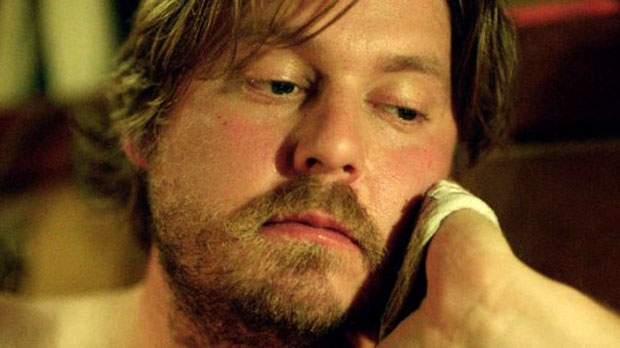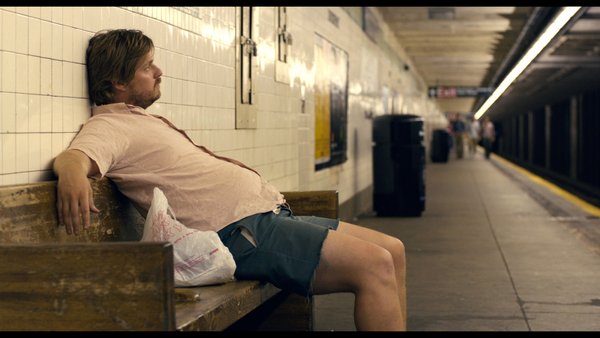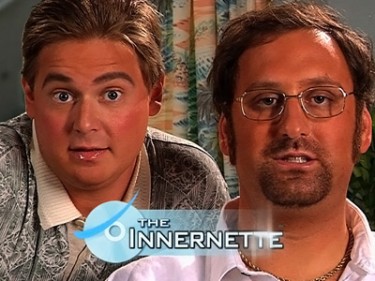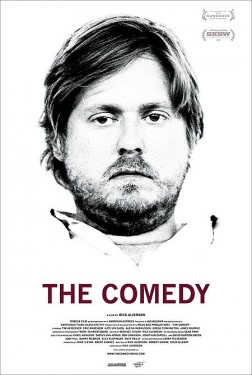 Back to selection
Back to selection
Tim Heidecker on The Comedy

It’s unlikely that anyone had a more schizophrenic Sundance this past January than Tim Heidecker. The 36-year old actor and filmmaker attended the festival with two projects – Tim and Eric’s Billion Dollar Movie, the feature-length culmination of his and longtime collaborator Eric Wareheim’s cult absurdist comedy TV series Tim and Eric Awesome Show, Great Job!, and the ironically named The Comedy, a dark drama from filmmaker Rick Alverson (New Jerusalem). And as both films have rolled out over the past year, Heidecker has had to juggle dueling personae – zany comedic curmudgeon and dramatic leading man.
In The Comedy, Heidecker plays Swanson, a depressed, affluent, and serially-detached Williamsburg hipster. Throughout the film, Swanson engages in a series of provocations with the outside world, testing the limits and boundaries of those around him, while arguably spiraling towards some kind of mental break. It’s a dark, pitiless performance — an unmistakable departure from Heidecker’s past work that still manages to comment on everything he’s done previously.
Filmmaker: Was indie film something you’ve always been interested in pursuing?
Heidecker: I went to film school, and I did a lot of theater in high school. Honestly, back then, comedy never seemed like a thing that was possible. When Eric and I met in film school, we really thought that we were going to make movies. That’s what we went there for. I’m a huge fan of all kinds of weird independent cinema. But comedy was something that was always fun, and it just began to become the way that we expressed ourselves.
When this came around, Eric and I had just finished Awesome Show. And after we saw Rick Alverson’s first film, we felt that this guy had a really great eye, and great control. It seemed like it would be a really interesting direction to go in – an interesting thing to try to do – to connect back to that love of film we had.
Filmmaker: How did Rick get on your radar?
Heidecker: I got a text from Will Oldham – also known as “Bonnie Prince Billy” – who was in Rick’s previous movie, New Jerusalem. Will sent me a text that said, “Do you have any interest in acting in a movie?” And I said, “Sure, why not?”
Filmmaker: What about this character drew you in?
Heidecker: I had lived in Williamsburg for years before moving to Los Angeles, and I knew a lot of people like Swanson. Part of me is like Swanson. The first conversations with Rick were about how we wanted to find actors or people that could talk to each other in a sort of casually offensive, cruel language, where it’s not really about what’s being said, where none of that stuff is meaningful. Instead it’s just all about the language, and the aspiration to make your friends laugh as opposed to hurting their feelings. We talked about how we haven’t really seen a lot of good movies where you capture that really naturalistic way that guys talk to each other. And then we talked about the arrested development of these guys, guys who go to art school or play in a band who never really settle into a career or a family. And they end up looking around, and they’re like 36, and they’re in Brooklyn, and they’re still living with roommates, and they still have rock posters on the wall.
We talked about there being different modes that this character would be in. He’d be in a social mode, or he’d be in a shut-down mode, or in an “I’m out of my element and I’m pushing the boundaries” mode. We talked about Swanson as being on the verge of some kind of nervous breakdown or something. It really isn’t specific in the film – and it shouldn’t be – but he’s in the midst of some kind of life moment. So the preparation was really about understanding this guy’s sense of humor, and understanding some very simple things about him. And then it was just, “Let’s relax, try to make something, and not try to overanalyze too much.”
Filmmaker: How much did you develop the character’s backstory? The film hints at a dysfunctional past, but how much of this was concrete to you on set?
Heidecker: There was not a lot of method acting homework being done. I think Rick and I both don’t believe that’s necessary. I don’t, at least.
I understood the basic facts of the character – that he had wealth, and a father that he had issues with. But beyond that, I just don’t find backstory helpful. It just becomes a mess for me. Maybe it would work in other situations, but with this I tried to be as naturalistic as possible, and as understated as possible. I think if I had cluttered that up with all sorts of backstory to remember it probably would have made my life more stressful.

Filmmaker: You said that you share traits in common with Swanson. How are you two similar?
Heidecker: I didn’t try to create an alternate sense of humor or delivery style. We share a style. We can both be sarcastic and goofy. That’s how I try to communicate.
But aside from that, all the content of what Swanson says and does – I would never put anybody in any of those positions. It’s like you might be sitting around a bar drinking beer, and you get into a routine with your close friends that’s like, “I’m going to rape you with my own shit filled piss.” But that’s not about the reality of it; it’s about the absurdity of it. And that’s where I think my character and I separate: – he brings those kinds of conversations into the real world, and to people who aren’t on the same page.
Filmmaker: It seems like he’s using that sense of irony to mask something else, some kind of deep-seated anger or loneliness.
Heidecker: I think it’s recreational. Rick used the world “recreational” a lot in describing this movie. We both saw it as a time-passer, this way that Swanson amuses himself in a depraved sort of way. The movie should make you think about the leisure class, and the fact that there are a lot of people out there who don’t have a lot to do. And I’m guilty of this too. There’s so much you can accomplish now in such a short period of time. And there are so many things that are done for you, especially with a character like Swanson, who probably doesn’t have to worry about working. You end up having a lot of time to fill in your life. And if you don’t have a family, and if you don’t have a religion, and you don’t participate in the government, you’re left with this idle hands sort of phenomenon.
Filmmaker: Why do you think certain audiences have had a really adverse, strong reaction to the character?
Heidecker: I can’t really say. There isn’t a tremendous amount of redemption or growth, and I think that people are conditioned to expect that. It’s a type of character that I think used to be much more prominent in films and has kind of faded away. Somebody like Travis Bickle from Taxi Driver – he doesn’t learn anything. There are a lot of movies from the ’70s and before that center around pretty unlikable characters. And the world is full of unlikable characters. I think you can like the movie and not like the character. That should be allowed.
Filmmaker: Do you reserve any sympathy for him?
Heidecker: Sure. I think there are moments in the movie, little glimpses of a human-being in there. Before the seizure scene, for instance, when he’s hanging out with (Kate Lyn Sheil’s character), you get the sense that this guy is a goofball. He’s trying to get laid, and he’s putting on the charm.
I feel like in two years it could go either way for Swanson. He could end up more isolated and cold and hardened, or he could start to open up. There seems to be room for either of those things to happen. There’s at least an interest, or a curiosity, in something beyond going through life making wise cracks and drinking and playing wiffleball.

Filmmaker: When I saw the film at SXSW, the audience was packed with people who were familiar with your work on Awesome Show. And that seemed spilled over into the first twenty minutes of the movie, where the audience was laughing at things that, if they were unfamiliar with your work, they wouldn’t find funny. It set a weird tone, because the movie is almost a deconstruction of the Tim and Eric style of humor.
Heidecker: I think the film rides this line, where on one end it could fall into the incredibly pretentious camp, and on the other, it could be seen as a satire or parody of a pretentious film. It’s so easy to fall into that trap, especially for us, for people to be like, “Is this just a goof on an independent art film, or is this really an independent art film?”
And it is an art film, but if you put it in the context of Awesome Show, then yeah, it’s something that we might end up doing. In the same way that we might parody a cop movie, we could parody this kind of movie. But I think people should expect that (Eric and I) aren’t ever going to be delivering what anybody expects. And this is just another case of that.
Filmmaker: Awesome Show took pleasure in confronting the audience with things that were unexpected or unpleasant – those very brass moments that pulled you out of the show in an almost Lynchian kind of way. And the movie perhaps doesn’t go to that extreme, but it’s still provoking with the audience in a similar way.
Heidecker: And I”d also add that a lot of my work is about the question of what comedy is, an exploration or dissection of comedy. In Tim and Eric, it’s often comedy itself being lampooned – we put the question of what is funny and what is not up for debate. In The Comedy, I think that idea comes across in the way people joke around, and the way humor is used as both a weapon and a shield.
Filmmaker: You’ve created this public persona for yourself – it’s hard to tell the difference between Tim Heidecker the filmmaker and Tim Heidecker the character. Is that something you find shifting as you hit the festival circuit to promote something that’s more overtly dramatic?
Heidecker: Eric and I came from the Andy Kaufman school, where part of the mystery was, “Who are these guys?” So there’s always been a lot of staying in character. But over time, as I’ve gotten a little older, that’s become less important to me. I’ve certainly started to express myself as myself on places like Twitter.
But I’m still interested in not having anybody figure out exactly what I’m about. It’s fun to keep that up. For instance, I have this persona as a standup character who’s just a total right-wing Tea Party guy, and I still use my own name for that. I’ve always felt that to hide behind a character name was just a waste of energy. If I have an idea, it’s always going to come out as Tim – whether that’s Tim from Tim and Eric or just Tim Heidecker. And I think people can find the connection between all of those ideas as coming from a similar voice.
Filmmaker: With Awesome Show, you had years to develop that persona and character. But here, you created this character over a two-to-three week film shoot. Did that make for a big difference?
Heidecker: For sure. That’s why Swanson is much closer to my personal self. We just decided that we were going to let him be as similar to me as possible, for the authenticity and realism of it. I think to attempt to create a character from scratch would have come across as phony, because there just wasn’t enough time to build this universe.
 Filmmaker: I wanted to ask about the marketing tactics. The film’s teaser trailer is almost daring the audience to endure the movie. You’re taking that revulsion that certain audiences felt, and using it for your own benefit. How did you guys decide on that tactic?
Filmmaker: I wanted to ask about the marketing tactics. The film’s teaser trailer is almost daring the audience to endure the movie. You’re taking that revulsion that certain audiences felt, and using it for your own benefit. How did you guys decide on that tactic?
Heidecker: Well that was all Rick, I think. And Tribeca Film was cool with it.
First of all, I think some of those quotes are awesome, and are totally an endorsement of the film. But to me, I have a real distrust and skepticism for film criticism, especially nowadays, and I think a lot of people do too. When Billion Dollar Movie came out, we got ripped apart by a lot of people. And then I started getting this feedback that was like, “Oh that was awesome. Did you see how Roger Ebert hated your movie? Congratulations!” Like that means something. Because, it’s like, “Fuck those people who think they know what’s good and bad.”
The Huffington Post piece is hilarious, though. That person seems like she wrote that review as she was walking out the theater. This movie, you’ve got to sleep on it. You’ve got to digest it. I think it’s a little silly to draw conclusions about a film 10 seconds after you’ve seen it. I think that’s a little confrontational. But the movie’s confrontational, so I guess it’s appropriate.
Filmmaker: At the SXSW screening, the first question of the Q&A was some angry woman basically asking Rick, “Why would you make a movie about this person, a fat, white, rich guy?”
Heidecker: (Laughs) I said, “I’m not fat. Dom Deluise is fat, lady.” Something like that.
Filmmaker: But how do you respond when people have that reaction?
Heidecker: I say, “Why make a movie about anything?” It’s an absurd question. Rick had an idea, and he wanted to make this movie, and he made it, and that’s the movie he made. The question of why is like, why do anything? Why paint a picture? Why make a horror movie? What the fuck? Who cares? Just get out of the way and stop asking irrelevant questions. This movie’s about something and it has something to say. And it’s supposed to actually make you feel, and make you feel uncomfortable, and make you question where you are in the world. So that’s her problem.
The Comedy, released by Tribeca Film, is playing in select theaters, and is available now on VOD and iTunes.
